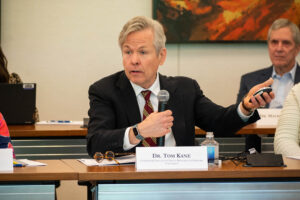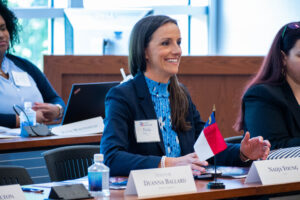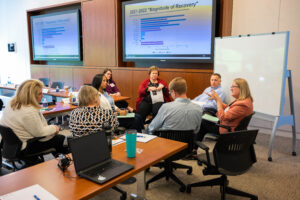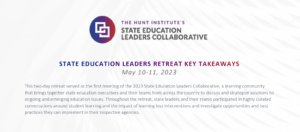The COVID-19 pandemic had a widespread impact on education, leading to nationwide school disruptions and inequitable access to distance learning. As students returned to in-person instruction, educators discovered growing evidence of learning loss – and academic declines on the 2022 National Assessment for Educational Progress (NAEP) revealed just how dramatic those losses were – with significant declines in reading and mathematics. While certain student populations experienced greater declines than others, very few students were spared from these losses.
As schools, districts, and state departments continue to tackle these historic losses and inequities, The Hunt Institute’s State Education Leaders Retreat model was created to better leverage evidence-based practices and expand equitable access to innovative learning opportunities while accelerating student success.
Since November 2021, The Hunt Institute and SAS Institute have co-hosted five State Education Leaders’ Retreats, bringing together nearly 20 state teams to participate in highly curated conversations around the impact of the pandemic on students and how to transform our educational systems to meet the demands of today.
This two-day retreat has since transformed into the State Education Leaders Collaborative, a learning community that brings together state education executives and their teams several times throughout the year to discuss and strategize solutions to ongoing and emerging education issues. This spring, the Collaborative explored state and district-level student-learning data, discussed strategies for evaluating learning loss interventions, and shared best practices state agencies can implement to get students back on track.

Throughout the two days, states heard from Dr. Thomas Kane – professor, economist, and Director of the Center for Education Policy Research at Harvard University, who shared his current research on education recovery efforts. Dr. Kane’s research revealed that, despite unprecedented COVID funds, many districts experienced only modest recovery rates, necessitating extensive and focused measures to bridge the gap. Dr. Kane shared his thoughts on a variety of strategies being considered by states to ensure comprehensive efforts in closing the educational divide, including high-dosage tutoring, doubling math instruction, summer school programs, and extending the school year.
Nadja Young (SAS) and Dr. Jeni Corn (North Carolina Department of Public Instruction) highlighted how data can be leveraged to address student needs and guide responsive measures. Dr. Corn shared how North Carolina has leveraged data to better develop policy and focus interventional strategies and encouraged ongoing efforts by states to strengthen communication and collaborative problem-solving among districts.
Dr. Will Jordan (The Wallace Foundation) and Delegate Carrie Coyner (Virginia) helped bridge the gap from policy to practice by offering reflections on the implementation of the Virginia Literacy Act and illustrating how similar policies can be woven into sustainable, long-term interventions. Delegate Coyner emphasized the importance of continued investment in transparency and accountability measures, urging states to provide easily accessible and understandable assessment data for parents.
Attendees also had the opportunity to spend time together in small groups action planning, identifying priorities, and applying insights gleaned from resource experts to their own state work. Attendees left the retreat with both 30- and 90-day plans to further research and even implement strategies, policies, and initiatives discussed throughout the retreat.
State teams expressed appreciation for the retreat and for the collaborative, nonpartisan environment that empowered them to spend two, uninterrupted days focused on improving systems for students.
The full set of key insights from The State Education Leaders Collaborative Spring Session can be found here.
In the coming months, the 2023 State Education Leaders Collaborative will continue to meet both virtually and in person. The August virtual session exploring the impacts of growing chronic absenteeism and declining enrollment will be held on Wednesday, August 2nd. The final in-person convening of the year will be held on October 25th– 26th in Cary, North Carolina and will focus on expanding non-academic support for students. The Hunt Institute and SAS look forward to continuing our work to assist states with their pandemic recovery efforts.








